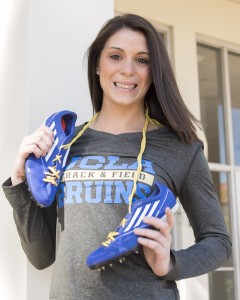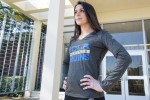It can be a challenge – sometimes a burden – for student-athletes to balance the weight of heavy classes and more than 20 hours of team activities throughout any given week. But many young adults face harder predicaments in their everyday lives, tougher obstacles to overcome.
That’s where one particular Bruin athlete steps in.
Kim Mackay, the only graduate student at UCLA to actively compete in Division I athletics, is currently pursuing a master’s degree in social welfare. Part of that curriculum entails an internship where, from 2 to 10 p.m. twice a week, the Princeton alumna devotes her time to teenagers at an inpatient drug and rehabilitation facility called Olympia Academy.
Under the supervision of Patty Abrantes, the program director of the 13-year-old Academy, Mackay helps across a wide range of duties – helping facilitate group therapy, conduct case management with professional counselors and spend time with the patients and their families.
“The kids look up to her, she sort of presents herself as a role model to them,” Abrantes said. “Even though she hasn’t had personal experience in terms of what these kids have gone through herself, I think they’ve learned a lot from her own experiences that she shares with them.”
Though the long hours and the constant balancing act can be stressful, Mackay said she’s seen amazing results since she started at Olympia last fall.
“We had the first graduate since I started working there,” Mackay said. “That was pretty cool because it shows the program works. Now she’s going to leave the facility, start living her life and she’s going to apply to colleges and have jobs and everything.”
Having already contributed to one success story, it only becomes increasingly easier for Mackay to continue making an impact as she becomes a more familiar face around the facility.
“A lot of kids now are starting to refer back to me and come back to me for advice and just to talk,” Mackay said. “That’s been a big moment for me because I think I’m actually going to be good at this kind of work.”
The lessons in empathy and leadership Mackay absorbs from the teenagers at Olympia are invaluable in the social work field and in the world abroad – including the realm of athletics.
As Mackay is one of the few fifth-years on a track and field roster dominated by freshmen and sophomores, her younger teammates said they look up to and learn all they can from Mackay’s successes both academically and athletically.
“Kim not only exemplifies how to exceed on the track as a competitor but is in grad school here and is able to get everything done on and off the track,” said sophomore distance runner Emily Fieberling. “It is really cool having someone who’s run at a higher level than you, and is still looking to run at a higher level than you, training with you.”
Mackay’s 800-meter and 500-meter personal bests landed in the top-five women’s times in Princeton’s history, her 4×400-meter relay team setting the school’s record.
She represented the United States in the 800 and on the 4×400 relay team at the World University Games this past summer, taking bronze in the latter. She’s now the fastest middle distance runner for UCLA, with sights set on the NCAA outdoor track and field championships.
Just last weekend at the Razorback Invitational in Arkansas, a meet featuring the top-four women’s track teams from around the country, distance coach Forest Braden watched Mackay take 10th place in the 800.
“She looked pretty fit, she looked pretty competitive, looked like she had a lot more in her,” Braden said. “It’s the fastest she’s ever opened up in the 800 before this early in the season. She’s really strong, she’s not sharp yet but she’s really strong, she just needs to compete more and she’s going to do really well.”

The main obstacle in Mackay’s way is the reason she’s at UCLA in the first place – her busy graduate school and internship schedule.
Unlike her undergraduate teammates who have, to a degree, some schedule flexibility, she has to find time in the day to train, more often than not in the early mornings or when small windows of opportunity present themselves.
“Sometimes she’ll have a couple hours between class,” Braden said. “She’ll come out for a workout and rush off to the rest of her day, so it’s hectic for her but she’s doing a really good job getting in what she needs workout-wise and running-wise.”
According to Braden, the most challenging thing isn’t finding allotted training time for Mackay, but making sure she gets in the little things such as sufficient recovery time and proper athletic nutrition.
Should she balance everything accordingly, Braden predicts a grand conclusion for Mackay’s collegiate career.
“She’s good enough to run much faster than she ever has,” Braden said. “She’s strong, she’s big, she’s mature, she has the experience and she’s a very tough competitor.”
When her collegiate career ends this spring, Mackay is unsure whether or not she will continue running. She has been successful for many years now, and though she can’t imagine being a full-time worker, she knows that’s the likely path in front of her.
But she’ll find time for both if she wants to. If people ask how she plans to manage that, she can refer them to everything she’s doing right now.
Regardless of her future in the world of track or the world of social work, one thing is certain: Kim Mackay will have left a lasting impact.
